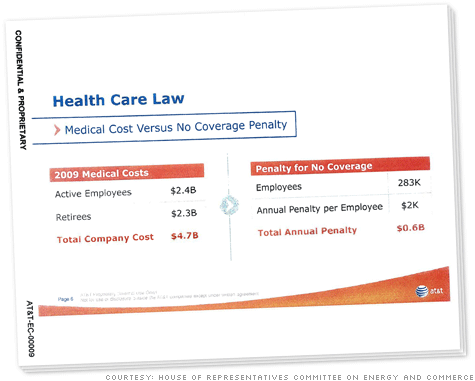Documents reveal AT&T, Verizon, others, thought about dropping employer-sponsored benefits

The great mystery surrounding the historic health care bill is how the corporations that provide coverage for most Americans -- coverage they know and prize -- will react to the new law's radically different regime of subsidies, penalties, and taxes. Now, we're getting a remarkable inside look at the options AT&T, Deere, and other big companies are weighing to deal with the new legislation.
Internal documents recently reviewed by Fortune, originally requested by Congress, show what the bill's critics predicted, and what its champions dreaded: many large companies are examining a course that was heretofore unthinkable, dumping the health care coverage they provide to their workers in exchange for paying penalty fees to the government.
That would dismantle the employer-based system that has reigned since World War II. It would also seem to contradict President Obama's statements that Americans who like their current plans could keep them. And as we'll see, it would hugely magnify the projected costs for the bill, which controls deficits only by assuming that America's employers would remain the backbone of the nation's health care system.
Hence, health-care reform risks becoming a victim of unintended consequences. Amazingly, the corporate documents that prove this point became public because of a different set of unintended consequences: they told a story far different than the one the politicians who demanded them expected.
...
AT&T produced a PowerPoint slide entitled "Medical Cost Versus No Coverage Penalty." A document prepared for Verizon by consulting firm Hewitt Resources stated, "Even though the proposed assessments [on companies that do not provide health care] are material, they are modest when compared to the average cost of health care," and that to avoid costs and regulations, "employers may consider exiting the health care market and send employees to the Exchanges." (Under the new bill, employees who lose their coverage will purchase health care through state-run exchanges.)
Kenneth Huhn, vice president of labor relations at Deere, said in an internal email that his company should look at the alternatives to providing health benefits, which "would amount to denying coverage and just paying the penalty," and that he felt he already had the ability to make this change under his company's labor agreement. Caterpillar felt it would have to give "serious consideration" to the penalty option.
It's these analyses -- which show it's a lot cheaper to "pay" than to "play" -- that threaten to overthrow the traditional architecture of health care.
...
Caterpillar and AT&T actually spell out the cost differences: Caterpillar did its estimate in November, when the most likely legislation would have imposed an 8% payroll tax on companies that do not provide coverage. Even with that immense penalty, Caterpillar stated that it could shave $25 million a year, or almost 10% from its bill. Now, because the $2,000 is far lower than 8%, it could reduce its bill by over 70%, by Fortune's estimate. Caterpillar did not respond to a request for comment.
AT&T revealed that it spends $2.4 billion a year on coverage for its almost 300,000 active employees, a number that would fall to $600 million if AT&T stopped providing health care coverage and paid the penalty option instead. AT&T declined comment.
...
What does it mean for health care reform if the employer-sponsored regime collapses? By Fortune's reckoning, each person who's dropped would cost the government an average of around $2,100 after deducting the extra taxes collected on their additional pay. So if 50% of people covered by company plans get dumped, federal health care costs will rise by $160 billion a year in 2016, in addition to the $93 billion in subsidies already forecast by the CBO. Of course, as we've seen throughout the health care reform process, it's impossible to know for certain what the unintended consequences of these actions will be.
Full story at CNN